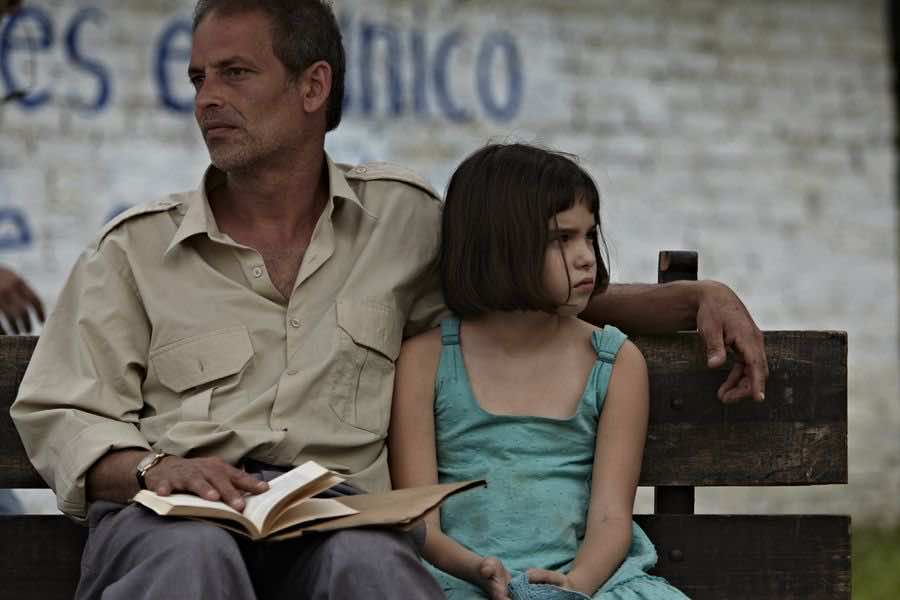Risk-taking was the name of the game at the 32nd annual Miami Dade College’s Miami International Film Festival. Festival goers had to take many risks in choosing their tickets, as the programming staff took many risks on young, little known filmmakers. As with any such risk-taking, the results were mixed, and that made for surprise standouts but also some disappointments.
This writer saw 22 feature films and three shorts in all at the festival (not counting the four excellent Orson Welles films I am familiar with that screened as part of a retrospective that remains ongoing; details here). That I only liked nine out of all those films at the festival (and this number includes two shorts) made this one of the less impressive festivals I’ve attended in a long time. It was a shame considering last year I mostly had to decide what film I liked less than others to find any weaknesses.
Almost half of the films I saw at the fest were as a juror for the Jordan Alexander Ressler Screenwriting Award category, which bestows a first-time feature screenwriter with a $5,000 grant. My fellow jurors included Gary Ressler, whose brother the award pays tribute to. Ressler brought his experience with story development at Disney Studios, working on films from Mulan (1998) to The Incredibles (2004). Mitchell Kaplan, knows what makes a good story, as he is the founder of the Miami chain of the independent book stores, Books & Books, also joined us at screenings and in the deliberation room. It was a pleasure judging with them and an honor to have been included on the jury.
Before a few remarks on some of the contenders, which does not reflect the opinions of my fellow jurors, I might as well note the winner of our award, which also stands as a highlight of the film festival: Theeb. Writer/director Naji Abu Nowar and  co-screenwriter Bassel Ghandour took the prize, which was accepted that night by a very gracious Laith Majali, a producer on the film. The director was unable to attend the award ceremony because he was attending a screening of the film at a village called Shakryieh in the Jordanian protected area of Wadi Rum for some of the Bedouin actors who participated in the filmmaking. For some it would be a first-time film-viewing experience.
co-screenwriter Bassel Ghandour took the prize, which was accepted that night by a very gracious Laith Majali, a producer on the film. The director was unable to attend the award ceremony because he was attending a screening of the film at a village called Shakryieh in the Jordanian protected area of Wadi Rum for some of the Bedouin actors who participated in the filmmaking. For some it would be a first-time film-viewing experience.
As for the quality of the film, it resonated on many levels. The script stood out because it not only told a sensitively intimate story from the perspective of a 10-year-old Bedouin boy, but it insightfully spoke to the tapestry of tribal life and brotherhood in 1916 Arabia as World War I loomed. Beyond that, the film has a timely quality due to the chaos that seems to constantly brew in the post-colonial world of the Middle East, which has caused generations of suffering and injustice. All of this comes across with a patient, delicate hand. Though the film was slowly paced, even drawn out sequences build toward some pay-off, be it an insight on the setting or the character or a shocking twist in the action. As my fellow juror Gary Ressler said, it says so much in so few words. Majali says he hopes the film gets U.S. distribution and sounds positive that a deal is in the works with a notable indie that specializes in world cinema. When the deal is secure, you can expect a more in-depth review for a film that is sure to continue to make waves in the world cinema stage this year.
There were several awards given that night including two major ones for a film I didn’t like. Here is the full list of winners:
Knight Competition Grand Jury Prize: The Obscure Spring (Mexico)
Knight Competition Grand Jury Award Best Performance: Cecilia Suarez, Jose Maria Yazpik and the entire cast of The Obscure Spring
Knight Competition Grand Jury Award Best Director: Abner Benaim – Invasion (Panama/Argentina)
Knight Documentary Achievement Award: Tea Time (Chile/USA), directed by
Lexus Audience Award for Favorite Feature Film: Kamikazee (Spain)
Lexus Audience Favorite Short Film: Young Lions of Gypsy (Italy/France)
Lexus Ibero-American Opera Prima Competition: In The Grayscale (Chile)
Jordan Alexander Ressler Screenwriting Award: Theeb (Jordan/Qatar/UAE/UK)
Park Grove Shorts Competition: Young Lions of Gypsy (Italy/France)
Honorable Mentions: A Tree in the Sea (United Arab Emirates) & Alba Baptista for her performance in Miami (Portugal).
Miami Encuentros: The Apostate (Spain/France/Uruguay)
CINEMASLAM
Grand Prize winner: The First Day
Audience Award winner: The First Day
Best Documentary: Romana
Best Drama: The First Day
Best Actor: Juan Jimenez – The First Day
Best Actress: Valentina Jimenez – The First Day
Best Director: Rita Pereyra – The First Day
Best Technical Achievement: Timothy Wilcox – Top Shelf
Reflecting on the films in the Jordan Alexander Ressler Screenwriting Award, there were a few strong contenders in the group, including A Girl at My Door, a film from Korea by first-time feature director July Jung. The film stands as a smart, progressive example of story-telling in dealing with sexual orientation while both offering social commentary while staying true to strong storytelling. Almost as strong was Tour de Force (Hin und weg), a film from Germany by Christian Zübert. The film pulled more tears from an audience than I ever heard. It dealt with a group of friends taking a cross-country bike trip to Belgium. It all seems like a fun time until the organizer of the trip reveals the reason for the trip: he was recently diagnosed with ALS … and assisted suicide is legal in Belgium. In the end, there’s a big reckoning for all involved, as the specter of death invites everyone to reevaluate their lives. It was just too bad that the delivery of this message arrived in a self-conscious sort of classical storytelling tinged with sentimentality.
Another decent film in the mix was Love at First Fight (Les combattants). A quirky humor dominated most of this French movie, as Arnaud (Kévin Azaïs) gradually fell for tough-girl survivalist Madeleine (Adèle Haenel). When he follows her to basic training, and she caves under pressure, she starts to fall for him. The two characters then tumble into predictable roles, deflating the original dynamic flirtation between these characters that made the film engaging at the start. This sudden shift in Madeleine’s personality also felt disingenuous to her once interesting character.
basic training, and she caves under pressure, she starts to fall for him. The two characters then tumble into predictable roles, deflating the original dynamic flirtation between these characters that made the film engaging at the start. This sudden shift in Madeleine’s personality also felt disingenuous to her once interesting character.
Many of the other films in this category suffered by unfortunate turns in plotting that unbelievably betrayed characterization, sacrificing any honesty to the story and disrupting the viewer’s suspension of disbelief. That was the problem with Cut Snake, which could not get character dynamics to click with plot. There’s a twist in the drama toward the end of the film that betrays what could have been an interesting love triangle. Meanwhile, the weirdly disjointed horror/family drama Shrew’s Nest was inconsistent about character development throughout. It reached for mystery but stumbled into incredible convoluted revelations. Then there was 3 Beauties. What should have been an insightful satire into the obsession of beauty pageants in Venezuela, tumbled into poorly managed black comedy that grew tiresome fast, as the filmmakers hammered on the same joke over and over again.
Even outside of required viewing, feature film highlights were few in comparison to the disappoints. We also saw Ben’s At Home, a comedy about a young guy who decides to become a shut-in after his girlfriend breaks up with him … until a beautiful delivery girl shows up. It was cute but grew tiresome fast. Everybody Leaves (Todos se van), based on  the popular autobiographical book by Cuban writer Wendy Guerra, had some promise. The film’s narrator was a little girl who looked like Mafalda and is at the center of a custody battle in pre-Mariel era Cuba. Colombian director Sergio Cabrera did a great job capturing the atmosphere of the beach life and the complicated dynamics of a family unraveling in communist Cuba. However, the performances were sometimes uneven, and there was something a little too disturbing about the abuse the little girl suffered at the hands of her alcoholic father.
the popular autobiographical book by Cuban writer Wendy Guerra, had some promise. The film’s narrator was a little girl who looked like Mafalda and is at the center of a custody battle in pre-Mariel era Cuba. Colombian director Sergio Cabrera did a great job capturing the atmosphere of the beach life and the complicated dynamics of a family unraveling in communist Cuba. However, the performances were sometimes uneven, and there was something a little too disturbing about the abuse the little girl suffered at the hands of her alcoholic father.
My partner on this blog, Ana Morgenstern, was on her own for Sunstrokes (Las Insoladas), the second film by Argentinian director Gustavo Taretto, which proved to be another disappointment. Here’s what she had to say about it:
“Sunstrokes offers a funny look a 1990s Buenos Aires via six girlfriends who sunbathe on the roof of a building. Each of the characters has a quirk, a personality so distinct it almost errs on the side of stereotypical. Flor (Carla Peterson) is the leading lady of the pack. She instigates some of the action and is the stronger character of the group. Kari is a psychology student, she is interested in esoteric themes, like psychoanalysis through colors. Sol (Maricel Álvarez) is relaxed, and early on reveals  that she likes to make copies of other people’s photos when they are good. Vicky (Violeta Urtizberea) is a hairdresser whose portrayal almost verges on offensive. As the “naive” one of the bunch, she’s the butt of every joke. At one point in the film, she realizes that Ernesto “Che” Guevara is often referred to as “Che” because of his use of Buenos Aires’ slang. Then there’s Vale (Marina Bellati). Afraid of being alone, she goes everywhere with her dog and does not let the other girls speak ill around him. Finally, the newest of the group, Lala (Luisana Lopilato) is the youngest and is also very gullible. She believes in UFOs and does a great manicure.
that she likes to make copies of other people’s photos when they are good. Vicky (Violeta Urtizberea) is a hairdresser whose portrayal almost verges on offensive. As the “naive” one of the bunch, she’s the butt of every joke. At one point in the film, she realizes that Ernesto “Che” Guevara is often referred to as “Che” because of his use of Buenos Aires’ slang. Then there’s Vale (Marina Bellati). Afraid of being alone, she goes everywhere with her dog and does not let the other girls speak ill around him. Finally, the newest of the group, Lala (Luisana Lopilato) is the youngest and is also very gullible. She believes in UFOs and does a great manicure.
Throughout the film the sextet of gal-pals talk about life and decide to work together towards a common goal: to travel to Cuba next summer — all while being featured in tiny bikinis. Each of the side conversations is mundane and motivated to expose the world of women as a vacuous and idle world, void of depth and pathos but filled with easy laughs and lots of skin. The film also draws inspiration from its era, so cassette tapes and tape recorders along with giant cellphones are featured prominently, also for superficial comic effect. In all, the film is a one-dimensional cartoon that almost verges in the misogynistic.”
Ana did like Wild Tales, though, another film from Argentina. It opened the festival to uproarious laughter that filled the Olympia theater for much of the night. That film will be opening at several theaters in Miami this Friday, including the art houses O Cinema and the Coral Gables Art Cinema. A review is coming soon. Another film that premiered at the festival and coming to local screens very soon is Felix and Meira. It impressed the both of us and tells the story of the emotional wandering of a Hasidic Jewish wife for a secular man who can’t help but flirt with her. Canadian directors François Delisle and Maxime Giroux keep their approach low-key to the benefit of what could have been an overly quirky situation comedy. With the help of strong actors including a former Hasidic Jew who left that life to become an actor (Luzer Twersky) who plays the cuckold husband, the film stood as a highlight of MIFF 32.
The most consistent category for exciting, entertaining and thoughtful work came out the documentary portion of the festival. There were some big hype titles like Kurt Cobain: Montage of Heck and Wim Wenders’ return to the MIFF with Salt of the Earth, a film he co-directed with Juliano Ribeiro Salgado on the photography of his father, Sebastião Salgado. But the most thrilling documentary I saw was The Record Man,  a film that looked at the life of Henry K. Stone, founder of Hialeah’s TK Records, which is best known for having produced some of the most popular Disco hits of the ’70s. Now, I never liked disco that much. However, the film swept me off my feet, and I was absolutely delighted by the storytelling behind songs like “Ring My Bell,” “Rock Me Baby” and “Get Down Tonight.” That Stone saw past race and color to support songs he felt had quality spoke to his purist approach to his business, and the film paints an affectionate portrait of the so-called “record man” that will win anyone over to the genre because it so genuinely celebrates music and the passion of those behind it.
a film that looked at the life of Henry K. Stone, founder of Hialeah’s TK Records, which is best known for having produced some of the most popular Disco hits of the ’70s. Now, I never liked disco that much. However, the film swept me off my feet, and I was absolutely delighted by the storytelling behind songs like “Ring My Bell,” “Rock Me Baby” and “Get Down Tonight.” That Stone saw past race and color to support songs he felt had quality spoke to his purist approach to his business, and the film paints an affectionate portrait of the so-called “record man” that will win anyone over to the genre because it so genuinely celebrates music and the passion of those behind it.
Another smaller documentary that celebrated a different kind of artist was Architecture of Color, which focused on Rio de Janeiro artist Beatriz Milhazes. Like Record Man, it featured talking heads and a straight-forward approach. However, like Record Man, the film never loses its focus on emphasizing the art. As Record Man is at its best when it highlights the songs, Architecture of Color is at its most interesting when we are watching Milhazes create. Architecture of Color screened with another notable documentary, the 11-minute short “Papa Machete,” which was made by local filmmakers director Jonathan David Kane and producer/writer Jason Fitzroy Jeffers. It’s a film I have happily covered extensively for “Miami New Times” only because it is so good (read the articles here).
I saw only one other locally-made documentary of note, The Holders. It certainly highlighted an important issue: the throw-away treatment of many pets in the Miami-Dade County area. Director Carla Forte provides an array of voices, from those working in public animal shelters to veterinarians to passionate, sometimes zealous animal rights activists. Most interesting, however, are the titular “holders,” who are ambivalent pet-owners prepared to give up their pets to certain euthanasia at animal shelters because the pet has become an inconvenience. The camera almost never identifies them but shoots them vérité style, from the shoulders down, at the shelter, as they nonchalantly give excuses as to why they can no longer “hold” them (too sick, the family’s moving, the dog pisses the carpet, etc.). It’s compelling stuff, which is unfortunately what made the film’s righteous tone, including an overly-sentimental voice-over featuring poetry that spoke of the intelligence and soul of animals, feel so heavy-handed. Still, those who think owning a pet might be “fun” should watch this documentary because, indeed, they are taking in another family member and all the responsibility that comes with such a decision.
There were other films we covered already on Independent Ethos. Check those out, including interviews and reviews, by following the Miami International Film Festival tag. It was a memorable festival, and I really feel humbled by executive director Jaie Laplante’s faith in my opinion to be granted an influence on blessing one of this year’s films with an award. Meeting fellow film lovers, filmmakers and film critics from out-of-town was also a great highlight. Tis an important part of the festival experience, and that stands as a great highlight of this year’s festival too. We attended several parties and had many intelligent conversations and some fun times. I only hope for more movies to love next year.















